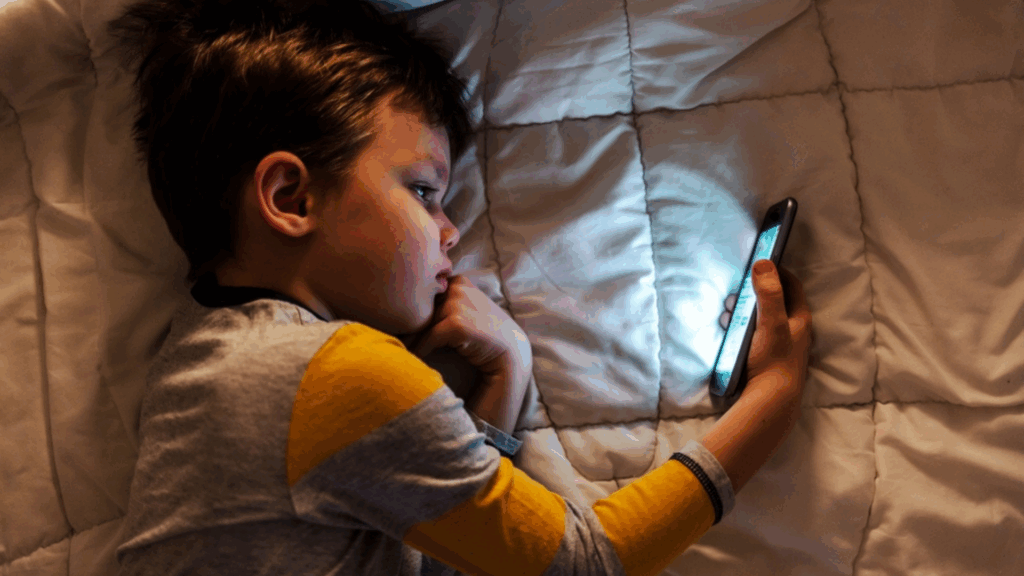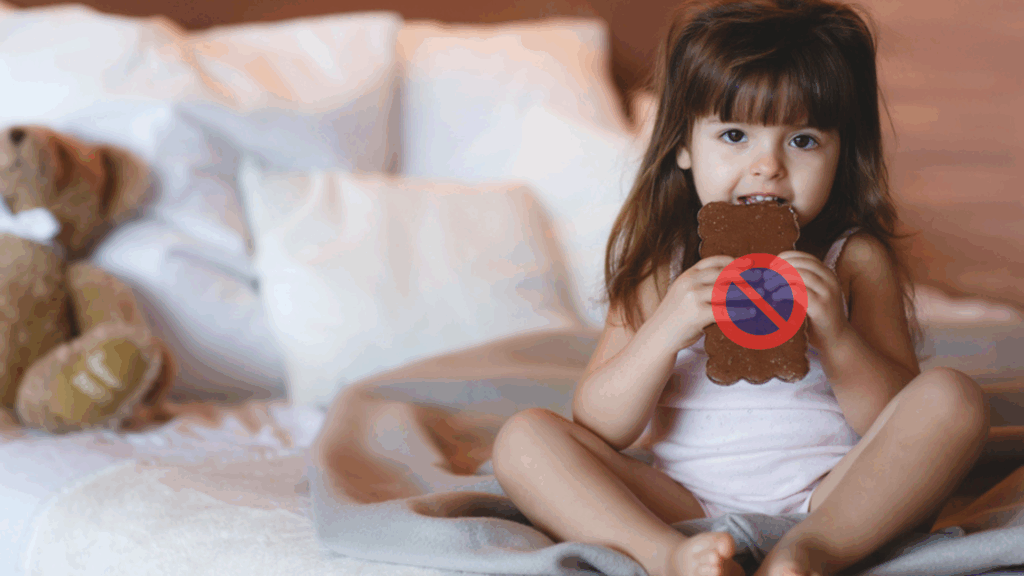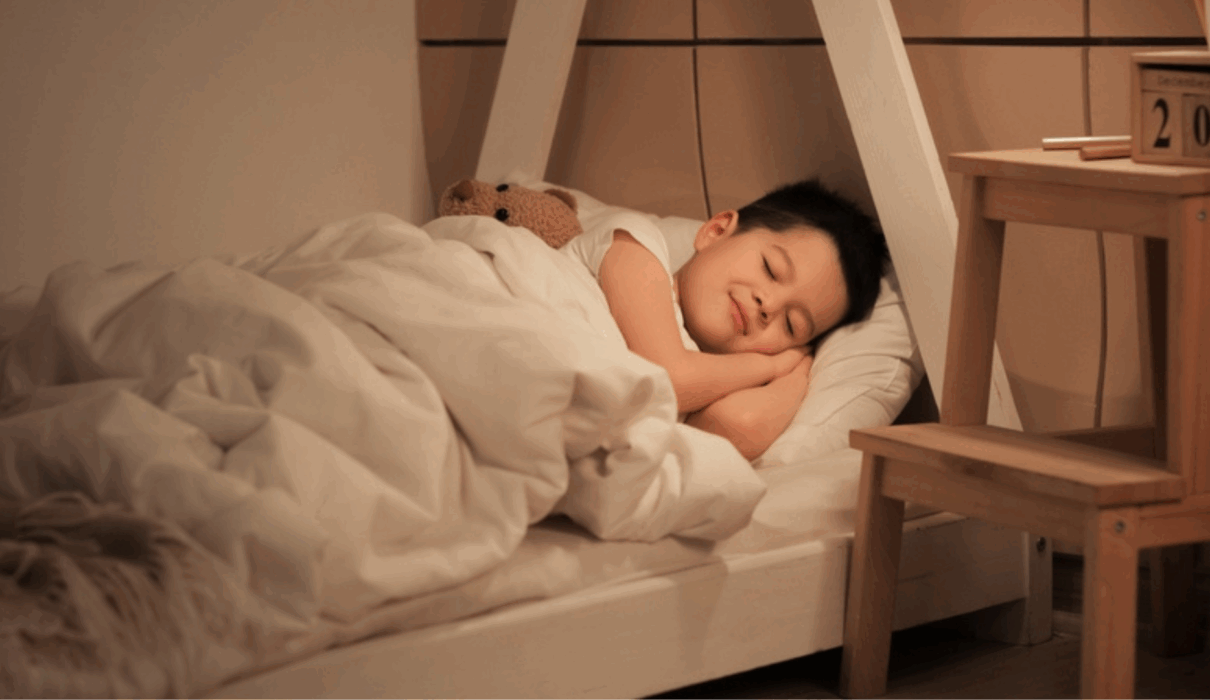Sleep plays a big role in your child’s mood, growth, learning, and daily energy. But with busy routines, screens, and distractions, it can be hard to make sure kids get the right rest every night. That’s where healthy sleep habits come in.
In this blog, you’ll learn how to build strong sleep routines for your child. We’ll talk about why sleep matters, how much sleep your child needs, and simple tips you can follow each night. Whether you’re a new parent or dealing with bedtime battles, this guide will help you make bedtime calm and consistent.
Why Does Sleep Matter for Kids?
Sleep is not just rest time, it’s growth time for a child’s body and brain. When kids sleep well, their minds stay sharp, moods improve, and bodies grow stronger. Sleep helps with memory, learning, emotional control, and even the immune system.
A well-rested child is more likely to stay focused at school, handle emotions better, and stay physically healthy. On the other hand, poor sleep can lead to crankiness, trouble paying attention, and frequent illness. That’s why building healthy sleep habits early on is one of the most loving and practical things you can do for your child.
How Much Sleep Do Kids Need?
Understanding how much sleep your child needs is the first step toward building healthy sleep habits. Children’s bodies and brains grow rapidly, and they need plenty of rest to support their development. When kids don’t get enough sleep, they may face trouble with focus, learning, emotions, and physical health. That’s why it’s important to know the right amount of sleep by age and create a routine around it.
Infants (4-12 months):
Infants need 12 to 16 hours of sleep in 24 hours, including naps. At this age, sleep is closely linked to brain growth. A calm bedtime routine like dim lights, soft lullabies, and gentle rocking helps form early healthy sleep habits that can last a lifetime.
Toddlers (1-2 years):
Toddlers need 11 to 14 hours of sleep each day. They’re exploring the world and often resist bedtime. A fixed sleep and nap schedule, along with quiet pre-bedtime activities, supports their physical growth and emotional regulation while setting the foundation for healthy sleep habits.
Preschoolers (3-5 years):
Preschoolers should get 10 to 13 hours of sleep. As imaginations grow, nighttime fears may begin. A predictable bedtime routine like a warm bath, a bedtime story, and snuggles helps children feel safe and ready to sleep, promoting stronger sleep habits.
School-Age Kids (6-12 years):
This age group needs 9 to 12 hours of sleep each night. With school, homework, and screens, their minds stay active late into the evening. Help them build healthy sleep habits by limiting screen time before bed, setting a regular bedtime, and encouraging a quiet environment.
Teenagers (13-18 years):
Teens require 8 to 10 hours of sleep, yet many fall short due to school pressure, screen time, and social life. Encourage them to value rest by helping them create a tech-free wind-down routine and reminding them that good sleep improves focus, energy, and even mood.
Common Barriers to Healthy Sleep
Even with the best intentions, many families struggle to maintain healthy sleep habits. Disruptions in routines, screen time, emotional stress, or even diet can interfere with how well children sleep. Recognizing these barriers is the first step to solving them and getting your child back on track.

Too Much Screen Time Before Bed
Digital screens TVs, tablets, phones emit blue light that can confuse the brain and delay sleep. Watching cartoons or scrolling late into the evening can keep kids alert instead of winding them down. Limiting screen use at least 1 hour before bedtime helps restore healthy sleep habits.
Late-night Snacking or Sugary Foods
Heavy or sugary snacks before bed can cause discomfort, restlessness, or a burst of energy. Foods like chocolate, candy, or even soda stimulate the body when it should be winding down. Avoid giving kids such snacks close to bedtime to maintain their healthy sleep patterns.
Anxiety or Bedtime Fears
Nighttime can bring out fears in children of the dark, being alone, or scary dreams. Stress at school or home can also show up as sleep resistance. Calming bedtime routines and reassuring words can ease their mind and support healthy sleep habits.
Irregular Sleep Schedule
Going to bed at different times every night confuses the body’s internal clock. When kids don’t follow a regular sleep routine, it becomes harder to fall asleep quickly and wake up refreshed. A fixed bedtime and wake-up time help create dependable sleep habits.
Overscheduled or Overstimulated Evenings
After-school activities, homework, and late outings can overstimulate kids. When they stay active too close to bedtime, it becomes hard to settle down. Simplifying evening routines allows their bodies and minds to prepare for sleep more naturally.
Establishing Healthy Sleep Habits
Building healthy sleep habits in kids takes consistency, care, and a calm routine. Sleep isn’t just about the number of hours they also need good sleep quality. The goal is to help your child feel safe, relaxed, and ready to sleep each night, forming strong habits that last a lifetime.
Set a Consistent Bedtime and Wake-Up Time
A fixed sleep schedule is one of the strongest tools for healthy sleep habits. Going to bed and waking up at the same time every day even on weekends helps regulate your child’s body clock. This predictability trains their mind and body to sleep better.
Create a Simple, Soothing Bedtime Routine
Routines like a warm bath, brushing teeth, bedtime stories, or soft music prepare the body to wind down. Repeating these activities each night signals the brain that sleep is coming, helping to form calm and healthy sleep habits without resistance.
Keep the Bedroom Quiet, Dark, and Cool
A peaceful sleep space supports deep rest. Use blackout curtains to block light, reduce noise, and keep the room slightly cool. A cozy blanket and favorite stuffed toy can also bring comfort, creating a relaxing space that encourages healthy sleep.
Turn Off All Screens Before Bed
TVs, tablets, and phones should be turned off at least an hour before sleep. Blue light delays melatonin release the hormone that makes us sleepy. Avoiding screens helps children fall asleep faster and stay asleep longer, keeping sleep habits strong.
Offer Emotional Comfort and Reassurance
Sometimes kids just need to feel secure. A quick talk about their day or a few extra hugs before bed can ease anxiety or fear. When they feel safe and supported, they rest better and healthy sleep habits become easier to follow each night.
Tips for a Peaceful Sleep Space
A calming and well-arranged bedroom makes a big difference in supporting healthy sleep habits. The goal is to create a space where your child feels safe, relaxed, and ready to rest. Even small changes in the environment can improve the quality of sleep over time.
Choose a Comfortable Mattress and Bedding
A soft yet supportive mattress suited for your child’s age helps them sleep comfortably through the night. Use breathable cotton sheets and a cozy blanket. The bed should be inviting, making bedtime something to look forward to every day.
Keep the Lighting Dim and Warm
Bright or cool-toned lights can confuse the body and delay sleep. Use a small, warm nightlight or soft bedside lamp during the bedtime routine. Dim lighting signals the brain that it’s time to wind down, which supports healthy sleep habits naturally.
Minimize Noise and Distractions
Keep the room as quiet as possible. If outside noise is a problem, consider using white noise machines or soft music to create a calm atmosphere. Also, remove toys that make sounds or blink lights to avoid sudden distractions during the night.
Use Soothing Colors and Decor
Choose soft, pastel colors for walls and bedding blues, greens, and lavender shades are calming. Avoid bright red or bold patterns that can be stimulating. A clutter-free, gentle environment helps your child relax and follow healthy sleep habits with ease.
Keep the Room Clean and Organized
A messy or crowded room can cause stress without even realizing it. Make it a habit to tidy the room before bedtime. Teach your child to put toys away, fold blankets, and set their bedtime books aside. A clean space supports a calm mind.
Additional Tips Based on Age Group
Children at different ages have different sleep needs and patterns. Understanding what works best for each stage can help parents create better routines that promote healthy sleep habits from toddlerhood to the teen years.
Toddlers (1–3 Years): Set a Firm Routine
Toddlers thrive on structure. A consistent bedtime and wake-up time, even on weekends, helps regulate their internal clock. Include a calming pre-bedtime routine like a bath, story, or lullaby. Avoid overstimulating play or screen time in the hour before bed.
Preschoolers (3-5 Years): Reduce Fears and Use Comfort Items
Preschoolers may start developing fears of the dark or being alone. Support healthy sleep habits by offering a favorite stuffed animal, nightlight, or bedtime reassurance. Keep the bedtime routine gentle and positive to avoid rushing or scolding.
School-Age Kids (6-12 Years): Limit Screen Time Before Bed
At this stage, kids may want to use tablets, TV, or phones. Set a rule to turn off all screens at least one hour before bedtime. Encourage calming activities like reading or puzzles. Healthy sleep habits become easier when screen time is replaced with quiet time.
Preteens (10-12 Years): Encourage Journaling or Quiet Talk
As children grow, they may feel more stress from school or social life. Help them process their thoughts by encouraging journaling or having a quiet bedtime chat. Creating space for emotional expression supports deeper, more restful sleep.
Teenagers (13+ Years): Let Them Sleep In (When Possible)
Teens experience natural shifts in their sleep cycle and may find it hard to sleep early. Let them sleep in a little longer when the schedule allows. Help them avoid caffeine, late-night studying, or long naps, which can disrupt healthy sleep habits at night.
Top 5 Healthy Sleep Habits to Start Tonight For Parents
Helping your child sleep better starts with small, consistent changes. As a parent, you don’t need to wait for these healthy sleep habits to begin tonight. They are simple, practical, and proven to make bedtime easier and more peaceful for your child.
Set a Consistent Sleep Schedule
Stick to the same bedtime and wake-up time every day even on weekends. A regular routine helps your child’s body get used to sleeping and waking up at the same time, building strong, healthy sleep habits over time.
Turn Off Screens One Hour Before Bed
Television, phones, and tablets emit blue light that keeps the brain active. Powering down screens at least one hour before bed gives your child’s brain time to relax and prepare for rest. Replace screen time with quiet, calming activities like drawing or reading.
Create a Wind-Down Routine
Help your child wind down each night with a calming routine. This might include brushing teeth, putting on pajamas, reading a short story, or soft background music. A predictable pattern signals the brain that it’s time to sleep.
Keep the Sleep Environment Calm and Dark
Make sure your child’s room is cool, quiet, and dark. Use blackout curtains, white noise machines, or nightlights if needed. A peaceful sleep space reduces interruptions and helps build strong and healthy sleep habits.
Avoid Sugar and Heavy Meals Before Bed
Foods high in sugar or late dinners can make it harder for kids to fall asleep. Offer a light, healthy snack if needed like a banana or warm milk. Keeping bedtime snacks simple supports better sleep and fewer overnight wake-ups.

FAQs
1. Can exercise help kids sleep better?
Yes, daily play helps kids sleep well. Just avoid intense activity close to bedtime.
2. Is bedtime consistency important on weekends too?
Yes, keeping similar sleep times on weekends helps kids stay on track.
3. Why does my child wake up at night so often?
It could be due to bad dreams, noise, or discomfort. A calm sleep space can help.
4. Can naps affect nighttime sleep?
Yes, late naps in older kids may delay bedtime. Keep naps age-appropriate.
5. Is it okay for kids to sleep with a nightlight?
Yes, if it’s dim and warm-colored. It can help kids feel safe without disturbing sleep.
Conclusion
Raising kids with healthy sleep habits isn’t always easy but it is worth it. Good sleep supports their growth, mood, learning, and overall well-being. From creating peaceful bedtime routines to setting screen limits and choosing age-appropriate sleep schedules, small steps make a big difference.
By focusing on consistency, comfort, and calm evenings, you’re giving your child one of the best gifts: restful sleep. Stick to what works, adjust with time, and always listen to your child’s needs. Healthy sleep is not just about hours it’s about quality, rhythm, and feeling safe.
Let sleep become a soothing part of your child’s daily rhythm and your parenting journey will feel lighter too.

